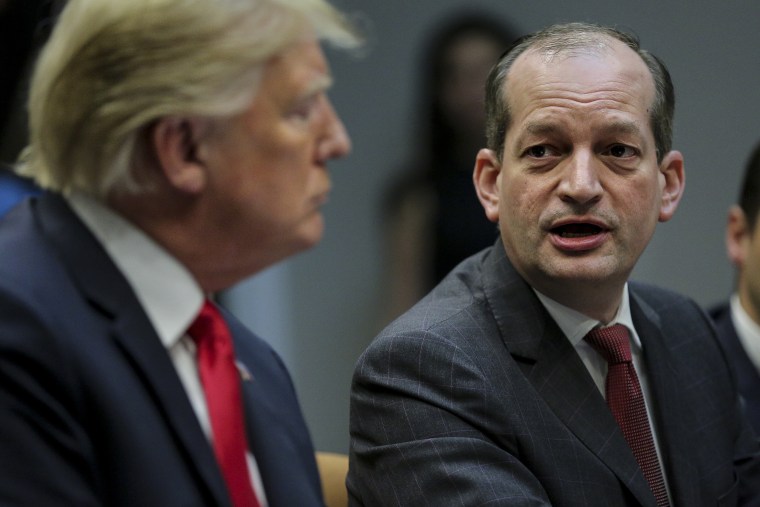As former federal prosecutors of over 25 years combined who worked on dozens of sex trafficking cases, the treatment of some of the most vulnerable victims by then-U.S. Attorney Alex Acosta in the Jeffrey Epstein case is stunning and raises every sort of red flag.
Of course, federal prosecutors are not perfect, and mistakes and lapses in communication with victims — even tragic ones — do happen. But federal Judge Kenneth A. Marra’s detailed description of how things unfolded in this case makes clear that these were not mistakes by overwhelmed or overworked prosecutors. Rather, this appears to be a calculated plan by the prosecutor in charge — Acosta — acting in concert with Epstein’s defense attorneys to hide a plea agreement from young victims because they did not want bad publicity for Epstein, they did not want other perpetrators exposed and/or they did not want the victims to object.
Any one of these motivations would be contrary to the practices and instincts of the prosecutors with whom we have worked to not cater to powerful defendants, but hold them to the same standards applied in every criminal case.
Acosta’s actions are even more egregious when considering the accusations in the case: For six years, Jeffrey Epstein allegedly ran a sex trafficking ring that preyed on more than 30 girls, some as young as 13, and personally raped and sexually assaulted many of them. But, though there are stringent federal laws designed specifically to address this type of horrific conduct, Epstein was allowed to plead guilty to state, not federal, charges pursuant to a non-prosecution agreement with federal prosecutors in 2008 and received a shockingly lenient sentence.
An NPA typically allows a defendant to resolve his or her case without any admission of wrongdoing, as the government agrees not to prosecute the defendant or to drop charges that had previously been brought. This is a significant benefit to defendants — they don’t have to admit the specifics of what they did wrong — and potentially a blow to victims, because they get no chance to confront the defendant in court and no closure from an admission of guilt. Judge Marra rightly noted in his ruling that prosecutors had discretion to enter into this kind of agreement with Epstein, but was extremely critical of the process by which they did that because, he said, they intentionally violated the Crime Victims’ Rights Act.
The CVRA provides certain specific rights to victims, including the right to be heard at any public proceeding in the district court, the right to confer with the prosecutors and the right to be treated with fairness and with respect for their dignity. Judge Marra determined that prosecutors violated those provisions because “the office never conferred with the victims about a NPA or told the victims that such an agreement was under consideration” but instead “mislead the victims to believe that federal prosecution was still a possibility” when they had already decided against it and informed Epstein's lawyers of that fact.
The deal with Epstein also seems to have violated departmental policy: The U.S. Attorney’s Manual, which sets out guidelines that federal prosecutors are required to follow, specifically says that, when prosecutors are considering whether to offer a defendant a NPA, they must consider not only the defendant’s culpability, but the interests of any victims. It’s hard to see how Epstein's victims’ interests were considered when they weren’t even told of the agreement.
So, in light of Judge Mara’s decision that prosecutors violated federal law, what comes next?
The Department of Justice's Office of Professional Responsibility, which has oversight for prosecutorial conduct, has opened an investigation of the handling of this matter. This is a good start, but likely will not be enough given OPR’s limitations in disciplining only current department employees — Acosta is currently the Secretary of Labor — and its limited subpoena and investigative powers. However, OPR can make criminal referrals to the department's Office of Inspector General, if warranted. In addition, referrals could be made to the relevant attorney bar associations, to allow them examine the conduct of the defense attorneys involved in the conduct the judge has found to violate the law.
Outside of the Justice Department, it also seems untenable for Acosta to be allowed to remain in his position as head of the Department of Labor — a federal agency with significant role to play in combating and prosecuting human trafficking cases and protecting the rights of minors. He should be fired or resign.
Most significantly, Epstein and anyone else involved in this crime need to be held fully accountable and the rights of the victims fully vindicated. Judge Marra has already ruled that the CVRA authorizes “the rescission or ‘reopening’ of a prosecutorial agreement, including a non-prosecution agreement, reached in violation of a prosecutor’s conferral obligations under the statute.” Judge Marra seems to be suggesting that Epstein’s agreement be voided and the federal investigation reopened. (Sen. Ben Sasse, R-Neb., has called for DOJ to do just that.)
It is always tricky to Monday morning quarterback another prosecutor’s decision: There are often facts and circumstances known only to the prosecutors that factor into whether to proceed with charges, take a case to trial or even enter into an NPA. However, given the many deficiencies in the NPA — most notably the systematic exclusion of victims from the resolution of this case, DOJ should reopen the investigation, and assign it to another U.S. attorney’s office or an arm of the DOJ.
The only way to preserve the integrity of this case is for a clean set of eyes to review the facts and ensure that justice is done.
CORRECTION (Feb. 23, 2019 5:53 pm ET): An earlier version of this article misstated the year of Jeffrey Epstein's conviction. It was 2008, not 2015.



